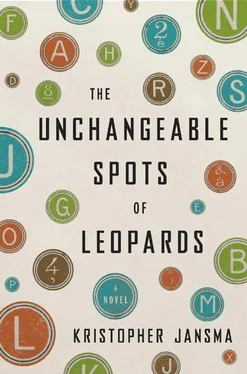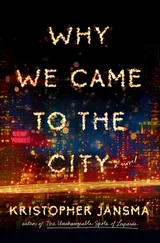And as he extended his arm and looked warmly toward the door, I saw him falter. The smug, serene confidence on his face crumbled, and, for a moment, I could see the same man who had wept in front of our entire classroom. A deadening silence followed. He glanced at me and then back out at the audience, sure they could see what a fool he really was.
He did not know my name.
Clearing his throat, he spoke slowly. “The one. The only. Pinkerton!”
Taking a deep breath, I stepped through the door. There was more applause as I walked straight to the podium. My heart was pounding in terror. Tell all the Truth? I looked out at the waiting crowd, at Evelyn, and Shelly, at everyone. Julian watched me from the shadow in the wings. A spotlight shone down on me from somewhere way up in the blackness above. In my hand I held my little rolled-up paper bomb, the words still hidden safely inside.
I took another slow breath, carefully unfurled the paper, and pressed it firmly against the lectern. I prepared to lay waste to everything in my path.
3. The Unchangeable Spots of Leopards
Can the Ethiopian change his skin, or the leopard his spots? Neither can you do good, who are accustomed to doing evil.
— JER. 13:23
This morning his name is Simon. He’s sitting on our couch beside the picture windows, through which comes a golden view of Soho and Tribeca. Simon’s lower half is wrapped in one of my towels, and he is sucking the milk out of a bowl of my Frosted Wheats and watching men’s swimming on my television. They all have the same look each time, the Simons, give or take — the ribbed chests, the high cheekbones, the tidy haircuts. This one has kind of a busted nose — not one of Julian’s finest. Better than last Thursday’s Philip. Or had he also been a Simon? It’s always something like Simon — Trevor, maybe; or Spencer; or Colin. One time we had a Geoff — with a G .
“Name’s Simon,” says Simon. “Have you seen this guy? Phenomenal. ”
He gestures to ESPN with my spoon, sending a fine spray of milk off across our suede-upholstered cocktail ottoman. Technically, it is Julian’s suede-upholstered cocktail ottoman, but without me around to sponge up the residue left behind by the many Simons, the ottoman would have gone out with last year’s trash. In which case, he’d have replaced it with a George Bullock octagonal table with inlaid lotus leaves, or something equally absurd.
“What guy?” I ask. Julian likes me to be polite to his overnight guests, although he certainly never is.
“Mitchell King!” Simon shouts through a mouthful of frosted wheat. “PHENOMENAL!”
As he shouts, little flecks of cereal land on Julian’s checkerboard, which he still keeps framed on the wall. I brush them off quickly.
New York Magazine has Mitchell King on its cover this month, all seven feet of him, crossing an Olympic-sized pool in a single stroke. Simon watches as the all-American phenomenon does an underwater turnaround in digitized slow motion. His body curls up like a beige fish and shoots away again.
Suddenly there’s the sound of water from the bathroom; Julian is awake. Simon grins and sets the bowl down on the table, leaving a ring of milk. When he stands up to greet his onetime lover, I can only grin as I lift the bowl and wipe the milk with the edge of my sleeve.
“BONJOUR à toi! Et aussi un matin doré!” Julian strides into the room, arms extended to the sunny Sunday skyline. He wears a stolen hotel bathrobe and his curly hair is matted from sleep; soon he will carefully tousle it with a Venetian cream and claim it looks somehow different. “Ouvrez le fenêtre dont je peux voir mon saint!”
When he spots Simon, however, Julian’s nicotine-scarred lungs deflate.
“Jazz Brunch,” I remind him cheerily, as I make myself scarce. Julian will now eject Simon from the apartment with the cold proficiency of an East Berlin customs agent. Visa expired, this Simon won’t be back in our country again.
Jazz Brunch has been a weekly ritual since Julian and I moved to this Great City in the East, three years ago. Fresh out of college, we were two writers ready for the world to anoint us as its newest young geniuses. Our heads were filled with Fitzgeraldian dreams of rooms in the Biltmore Hotel and of writing our Great American Novels at the cafés along Sixth Avenue, then on to have steaks at Delmonico’s with girls named Honora and Marjorie. In my defense, I’d only ever read about New York. Julian had actually been here before. Still, he acted as if the modern city, with her graffitied subways and omnipresent bodegas, was just some sort of temporary wrinkle in the fabric of civilization. Julian’s parents were currently off in Switzerland somewhere, running McGann International Trading, but part of their diversified portfolio included various rental properties around the island, one of which Julian and I had taken up residence in just off Washington Square Park.
Even this morning, as we stroll toward the arch in two-tone shoes and biscuit tweed, Julian seems startled to find the square crawling with bearded NYU students, propelling themselves about on skateboards, and not a horse-drawn carriage or a top hat in sight, as Henry James had promised.
As she does every Sunday, Evelyn meets us on the corner. This morning she clutches a script in her left hand, which bears the familiar, cragged face of Samuel Beckett. Her right hand holds a lit cigarette and a clump of wildflowers, roots attached.
Evelyn Lynn Madison Demont. Even four Anglo-Saxon names cannot contain her. She should be a “the Third” or a “Countess di” something-or-other. My heart has been lost in the frozen tundras of hers ever since Julian first introduced us in our college days, seven years ago. Now the accidental thought of her sends sparks through me like I am one of Henry Adams’s dynamos.
Everything I write is for her; none of it is ever good enough.
“If it isn’t Jeeves and Wooster. You two are later every week.” She grabs my wrist and checks the time on my gold watch. Then, pretending to scowl, she plants a kiss on each of our cheeks. Her blond hair smells of buttercream and her white skin of lemonade. Her lips brush against my cheek and they feel like the chitinous wings of a dragonfly.
“We were unavoidably detained,” Julian says.
“By a Simon,” I add, with a roll of my eyes. Julian is too busy stealing her cigarette to hear me. He inhales desperately, though he has only just finished one on our way over. Somewhere back inside the park comes the loud clatter of a skateboarder who has just screwed up a trick. Julian mumbles some vague threats about moving to Prague. In truth, he’s been threatening to leave the city for all sorts of reasons, ever since we arrived. But we know he won’t. Not without us.
He jabs the lit end toward the flowers. “Where are those from?”
“I mugged this little orphan boy for them,” she says, inserting two bluebells in my lapel and a prairie aster in Julian’s. She tucks a midsize daisy into her hair and drops the remainder on the sidewalk without a second’s thought.
“Shall we?” she asks, tucking the Beckett away into some heretofore-unseen purse. She extends an unblemished forearm and I hook my elbow around it.
“‘I can’t go on,’” I say, with the dramatic air of quoting things. “‘I’ll go on.’”
Jazz Brunch at the Washington, once held weekly in a lush ballroom to hundreds of Manhattan’s elite, has in recent decades been moved into a small cove on the basement level and done up like a high-class speakeasy. Maybe in Fitzgerald’s time, jazz music was a call to revolution — chaotic, arousing, and ever changeable. It disturbed the natural order; it tore up the old millennium, with its absurd wars and its drudgerous Puritanism; it declared reckless independence once and for all. But in our era of anthemic dance beats, power chords, and casually rhymed profanities, jazz music has become quaint and old-fashioned, appreciated only by those who were born too late — namely, the three of us.
Читать дальше











